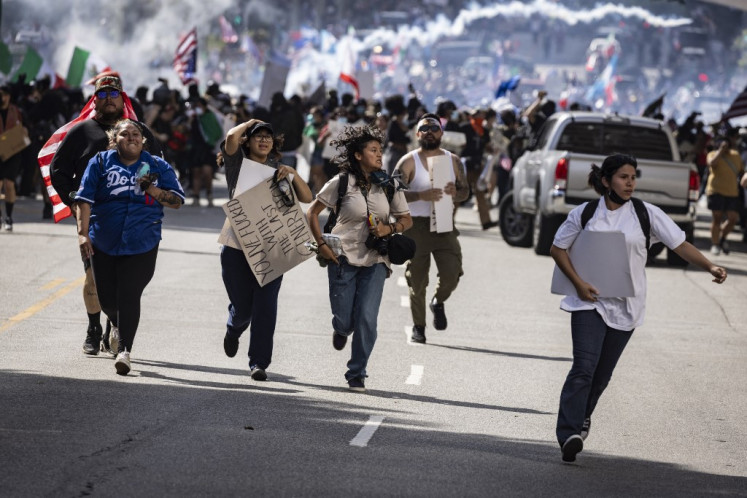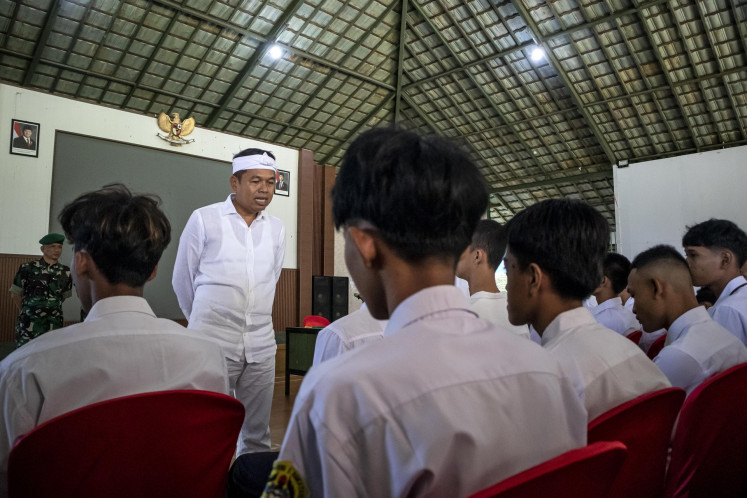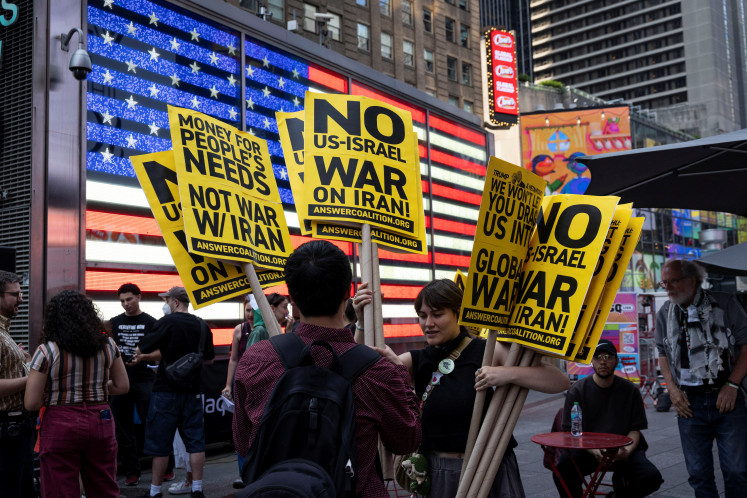Indonesia's #MeToo: Film industry workers move to create safer ecosystem from within
Change text size
Gift Premium Articles
to Anyone
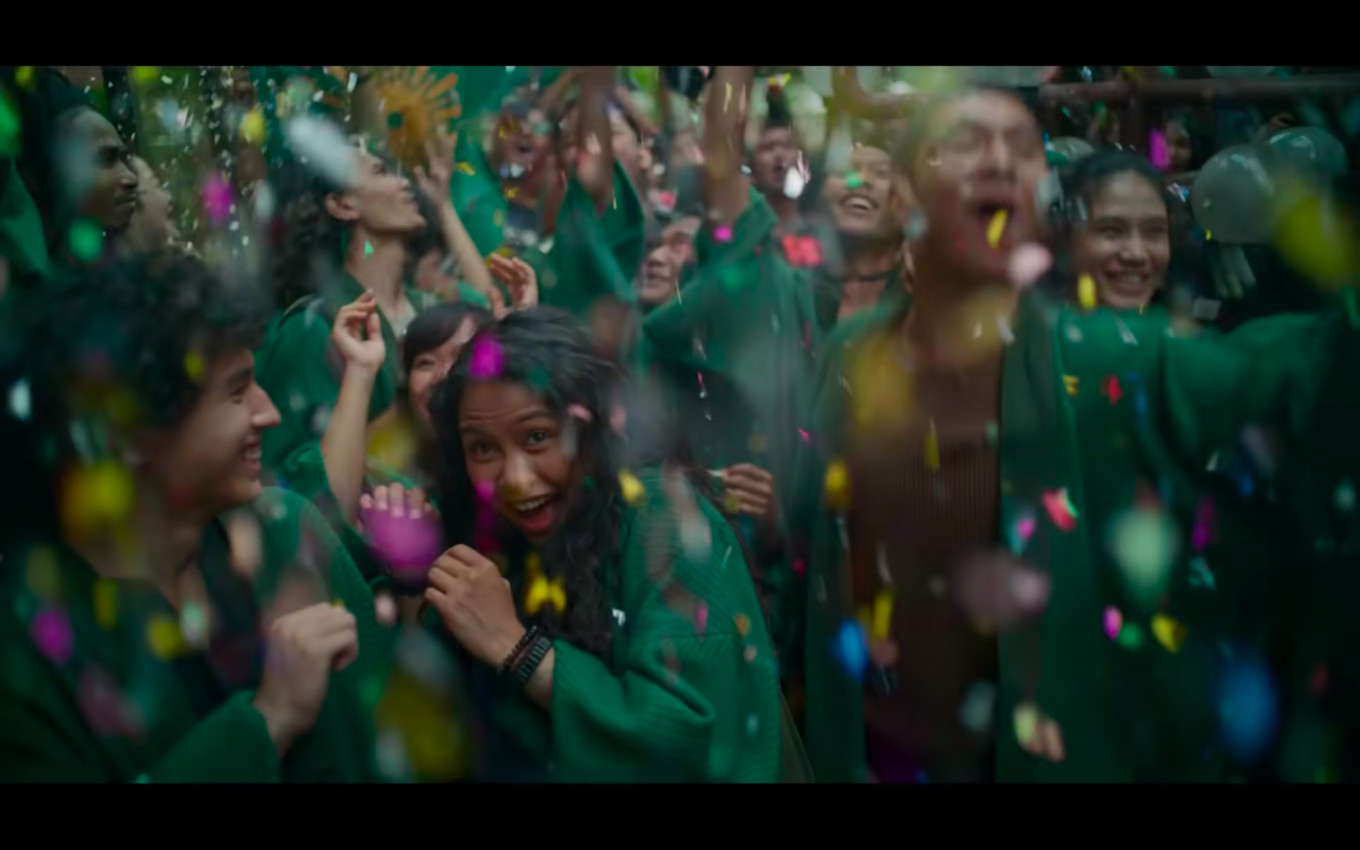
Indonesian film workers have launched their own #MeToo campaign to eliminate sexual violence across the industry.
The year 2021 was a good one for the country’s cinematic landscape, eliciting a strong wave of public praise and critical interest with the release of acclaimed films telling bold and distinct stories.
Director Edwin’s Vengeance is Mine, All Others Pay Cash, Kamila Andini’s Yuni and Wregas Bhanuteja’s Penyalin Cahaya (English title: Photocopier), among other films, garnered accolades on both the national and international stages and brought home prestigious awards.
The streak of promise was marred, however, when a sexual assault incident allegedly involving Photocopier’s scriptwriter surfaced only days before its premiered on Netflix. While the studio has not publicly named the individual involved, their identity can be easily discerned because their name has been removed from the film credits.
The incident was particularly ironic, as Photocopier tells the story of a sexual assault victim struggling to find justice against her powerful perpetrators. It also cast doubt over the problematic behavior of certain members of the film industry and their credibility in telling stories through film that function as social criticism.
Last week, leading female professionals in the industry such as director Kamila, actress Hannah Al Rashid and producer Mira Lesmana started a social media campaign, collectively promoting an effort to create a safe industry ecosystem.
“Silence is not always golden” reads the heading of the very first post Hannah uploaded to introduce the Twitter thread, with the hashtags #BerpihakPadaKorban (standing with victims) and #RuangAmanSinema (safe cinema space).
It continues: “This is an open invitation to all members of the Indonesian film ecosystem to commit and educate ourselves in building a safe environment free from sexual violence.”
Initiated by several industry associations, the campaign suggests providing training on sexual violence for film workers, encourages establishing an industry hotline for reporting incidents of sexual violence and harassment, as well as a dedicated committee to create a standard operational procedure (SOP) as an industry guideline for workers to follow in the event that a sexual violence incident is reported or happens during production.
While a film environment that is free from sexual violence might still be far, what have concerned parties in the film industry done to protect workers from predatory and other problematic behaviors that might be tolerated or normalized?
The Jakarta Post spoke to two industry insiders about today’s film ecosystem and their insights on how to create a safer place for all.
Safeguarding cast and crew
A film production is one of the most significant parts of the industry, but the production environment is also a hotbed of sexual misconduct and bullying among the cast and crew.
Gina S. Noer, one of the most prominent female Indonesian filmmakers today, said that to create a safer film industry, relevant parties should be more serious in creating and implementing standards and codes of conduct like other established industries.
“Only then can we identify the milestones that we have to pass to improve the industry and achieve wage equality, work safety and job security,” she told the Post on Jan. 14.
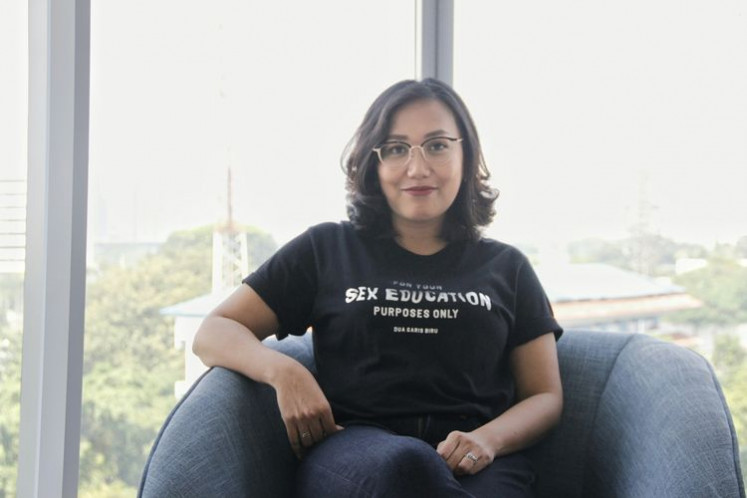
Gina said the lack of female policymakers and the preference for male crew members, as well as limited regeneration, significantly hampered the film industry’s move toward a more progressive production environment.
For her films, Gina and her production house, Wahana Kreator, implement a special SOP that aims to eradicate sexual violence and other kinds of problematic behavior. Since 2019, all workers involved in Wahana Kreator productions must agree to the related clauses in their contracts.
“We also provide education on what sexual violence and bullying are in the form of an infographic. [We also have] an integrity pact that should be signed by all people involved in a production, including their assistants [to] the actors’ drivers,” she said.
Wahana Kreator executives were involved in the research to create the infographic, while the company’s legal team drafted the integrity pact. The company also has set up a hotline to report any incidents.
Gina said the initiative to develop the contractual clauses and the integrity pact for cast and crew was triggered by a 2019 incident of a production intern who was sexually assaulted. Although the incident did not happen at a Wahana Kreator production, it was concerning for Gina and her peers that the victim needed three months to reach out to production executives.
“We tried to contact the victim and the perpetrator. We tried mediation. But the final settlement was not ideal, because both of them chose to write a public statement on social media,” Gina said.
These days, an online public tribunal is often the preferred avenue among victims of sexual violence to seek justice. Many times, victims feel like they have no choice other than to make their story go viral as a deterrent against their perpetrator, since the existing legal system often falls short in handling such cases.
Sadly, said Gina, publicizing their story online was not an ideal way to prevent sexual violence or to punish a perpetrator of sexual violence.
“It only ends as gossip, going viral briefly, without any positive improvements [in society],” she said.
According to Gina, Wahana Kreator has seen zero incidents of sexual violence or bullying during its productions since adding the new clauses and the integrity pact.
“People have become more mindful about what they do,” she said.
Gina wished that every worker in the film industry concerned about the issue would take more unified action so the industry as a whole could be wiser and more mature in handling such cases.
“We have to build a safe space from own our failures so that we can grow better in the future,” she emphasized, so that cases of sexual violence didn’t end up as social media “gossip”.
Protecting movie enthusiasts
Film critic Adrian Jonathan Pasaribu said that social interactions that blossomed through a shared love for movies did not happen only during film productions, which could be regulated through formal rules and contractual agreements.
They could also happen at public events such as film screenings and appreciation events, which had their own unique social fabric in which community members were intertwined in delicate situations.
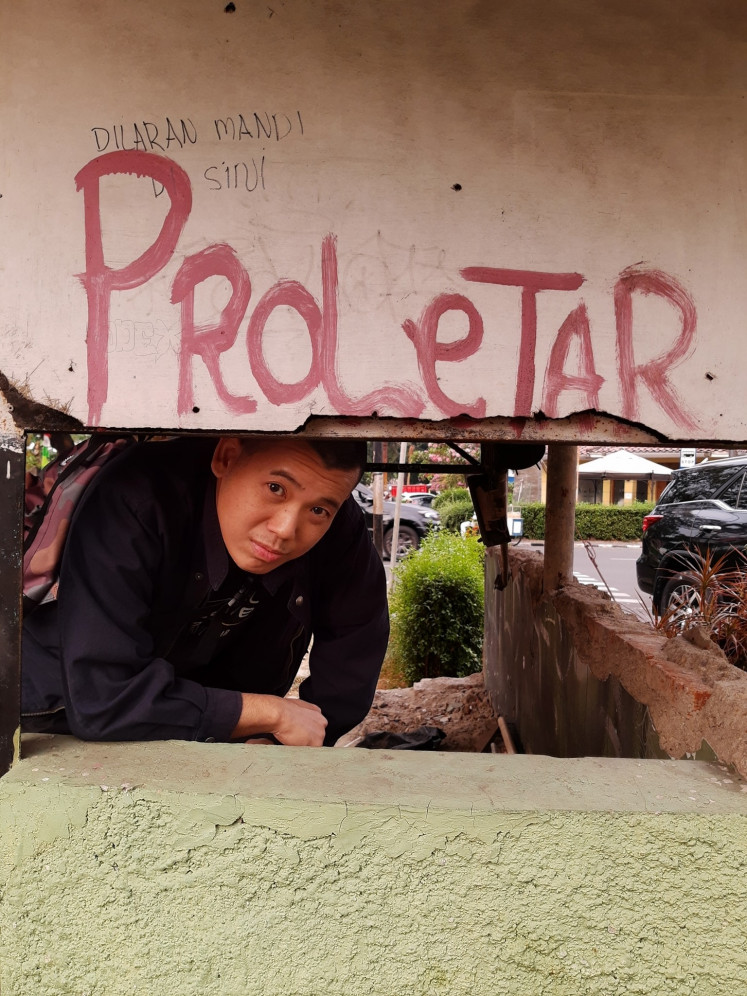
“At the community level, the situation is more chaotic because all activities are conducted based on a simple system of trust. Meanwhile, [relying merely on] a system of trust is never good protection,” Adrian told the Post on Jan. 13.
Adrian, who founded sexual violence hotline SGHT (Sinematic Gak Harus Toxic, or cinema shouldn’t be toxic) with fellow cinephiles in 2019, has heard many stories about incidents of sexual violence at film festivals, workshops, seminars and screenings.
He said it was a major task for film communities to admit that their activities were riddled with vulnerabilities that offered a space where sexual violence could happen easily.
“The pattern is usually very similar. One of the most rampant pattern is sexual misconduct happening during the closing [event] of a film festival, where everybody is in a state of euphoria and drunk,” Adrian said. He added that because this happened so frequently, members of the film community tended to shrug them off, thereby normalizing such incidents.
“[Sexually assaulting] people when you’re euphoric and drunk is not normal. It should not be normalized,” he stressed.
“How can we make a festival closer where you can still have fun, where you can still be drunk as a skunk without violating anyone or being violated by anyone?” Adrian said. “That is one of the questions we [wanted to answer] when we founded SGHT. We only had concerns and as yet, no solution.”
Abuse of power was also widespread, Adrian said, noting that one of the most common patterns was sexual misconduct that involved seasoned filmmakers and student volunteers who met at workshops or seminars.
For example, he says, a filmmaker is invited to a workshop or a seminar and meets a student volunteer who is years their junior, impressionable and awed by their “stardom”. They start to interact between workshop events, and the filmmaker starts to use the volunteer’s admiration to lure them into a more intimate situation. This can then escalate into sexual violence when the filmmaker uses manipulation or intimidation to “persuade” their victim into agreeing to a sexual act.
“[In many cases] the pattern is similar. We need to find a way to make these privileged guests know that they are being monitored. The volunteers must know that they are protected,” Adrian said.
He added that “the cinematic community must admit” such events were vulnerable to potential abuse in a power relationship.
Adrian wanted concerned parties in the film community to sit down to pool together their knowledge of sexual violence, which would ultimately help make the community and its events into a safe space.
“Maybe the resulting literature can be a reference for, at the very least, the communities, which are very vulnerable as we know it,” he said.
“If it can make it [through] to the industry, well past the politics of commercial cinema, it would be even better.”







